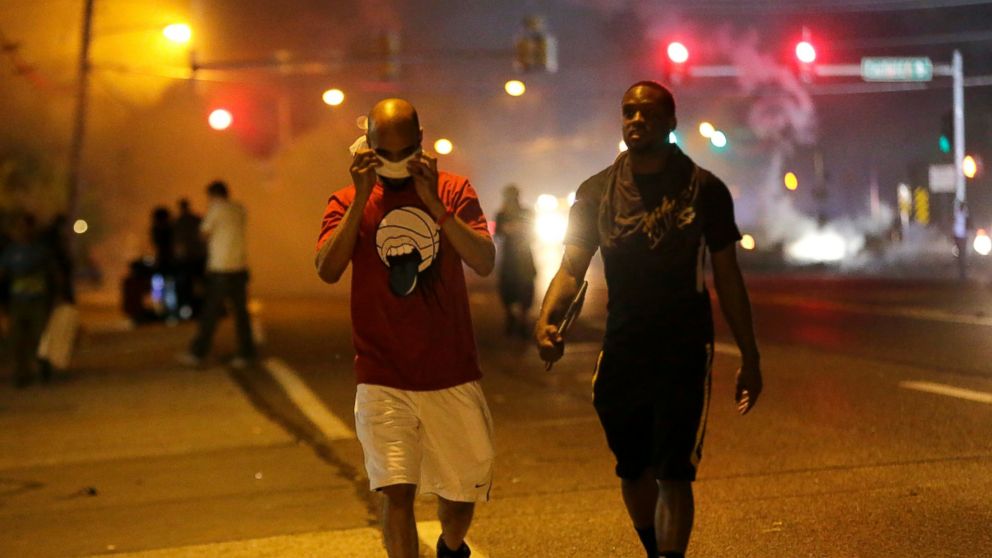International Critics Turn Tables and Wag Finger at US Over Ferguson Crisis
This is the first time Amnesty International has sent in observers in the U.S.

— -- The images of conflict coming out of Ferguson, Missouri, often look more like a restless Middle East capital than a Midwest town.
Police aggression. Detention of journalists. A call for respect for minority populations. They’re the type of issues the United States is usually scolding other countries about. This time, however, the criticism is coming the other direction.
Iran’s Grand Ayatollah tweeted about the “brutal treatment” of black people in the United States using the #Ferguson hashtag, China’s official mouthpiece wrote about America’s “human rights flaw,” and the Egyptian government called for “restraint and respect for the right of assembly and peaceful expression of opinion.”
Ferguson Cop Has No Temper, Is 'Struggling' With Shooting, Friend Says
Meet the Biker Group Who Says It's Set on Keeping Ferguson Safe
Jail Records at Odds With Ferguson Cop’s Claims That Outsiders Causing Trouble
The condemnation is not only limited to countries who may be gloating about the chance to slam the United States about its internal affairs for a change.
On Monday, United Nations Secretary General Ban Ki-moon, through a spokesman, called on authorities “to ensure that the rights to peaceful assembly and freedom of expression are protected.”
“He calls on all to exercise restraint, for law enforcement officials to abide by U.S. and international standards in dealing with demonstrators," Stephane Dujarric, the spokesman said.
Amnesty International, the global human rights organization, said it had sent observers to Ferguson. It’s the first time the group has deployed such a team within the United States.
The killing of Michael Brown, an unarmed black teenager, by a white police officer, and the police response to the protests that followed have raised tough, and for many Americans often uncomfortable, questions about the militarization of police, the treatment of press, and brought simmering racial tensions to the front burner.
Yet they have also afforded America’s foes the opportunity to point their fingers at the country that holds itself up as the beacon of freedom, justice and equality.
The United States has frequently denounced Iran’s suppression of dissent, including violent responses to political protests in recent years. But Iran’s Supreme Leader said the Ferguson violence was an example of American hypocrisy about human rights.
“Today like previous years, African-Americans are still under pressure, oppressed and subjected to discrimination. #Ferguson,” a Twitter account attributed to Iran’s Supreme Leader, Ayatollah Seyed Ali Khamenei, wrote on Sunday.
“Racial discrimination is still a dilemma in the U.S. #Ferguson,” he added. “Look at how US govt treats black community! It's not about 50-100 years ago but it's about today!”
Egypt, a country that has been criticized by the U.S. and others for its brutal police response to the Arab Spring uprising and persecution of minority sects, also weighed in.
The Foreign Ministry reportedly said it was “closely following the escalation of protests” in Ferguson and called on authorities to show “restraint.”
China’s official Xinhua news agency published a commentary saying that Ferguson is an example of how “racial divide still remains a deeply-rooted chronic disease that keeps tearing U.S. society apart.”
“The Ferguson incident once again demonstrates that even if in a country that has for years tried to play the role of an international human rights judge and defender, there is still much room for improvement at home,” the commentary said.
The Russian government, which rarely misses an opportunity to criticize the United States these days, has not said anything official about the Ferguson unrest, but RT, the Kremlin-funded network, has covered the protests closely.
Some opposition figures in Russia have lamented that the police response in Ferguson will give President Vladimir Putin, who often uses Western precedents to justify his own actions, an excuse the next time he wants to crack down.
“Dear American gvrnmnt [sic],you can't imagine how those who fight for freedom in Russia hate you these days. Putin saw this,” Maria Baronova, an activist who was arrested and jailed during an anti-Putin protest in 2012, wrote on Twitter.
U.S. State Department spokesperson Marie Harf responded to criticism from countries with mixed human rights records over the heavy-handed tactics of police in response to the Ferguson protests.
"When we have problems and issues in this country, we deal with them openly and honestly. We think that’s important, and I would encourage the countries you named particularly to do the same thing," Harf said, responding to a reporter who asked about reactions coming from countries including Egypt, China, Russia and Iran.
She rejected "any sort of comparison" between the U.S. urging Egypt not to jail journalists and opposition protesters and U.S. authorities’ handling of the protests in Ferguson.
ABC News' Ali Weinberg contributed to this report.




